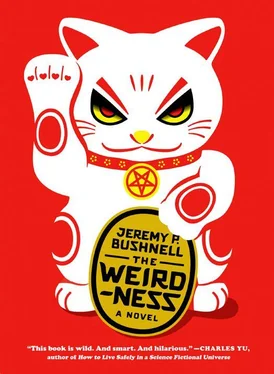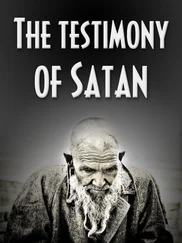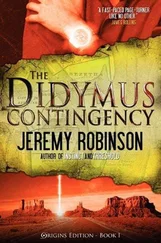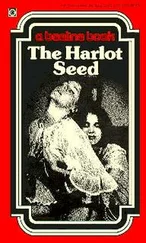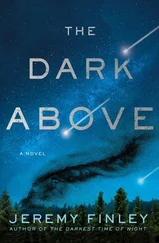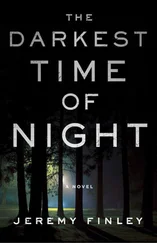Before he has a chance to really think about that, Denver speaks again. “Let me ask it this way,” she says. “Do you think you’ll try to kill me in the night?”
“No,” Billy says, with resolve.
Denver looks into his eyes, inspecting something in his pupils. She gets a penlight off her belt and shines it into each of them in turn. “You seem normal,” Denver says.
“I’m not,” Billy says.
“No,” Denver says. “You’re not. But I think that might be okay.”
They don’t order Chinese. They don’t go out and get wine. They drink a half a bottle of Jørgen’s port that they find in the back of a cabinet above the refrigerator and they go up to the loft.
For a while they lie in bed and watch the footage that Denver captured. Billy laughs out loud at seeing Anton Cirrus fall down the stairs, but then he remembers the reality of the situation and it sobers him.
“I think you saved my life,” Billy says, “showing up when you did. He really would have shot me if you weren’t there.” It occurs to him that that means he’s on his third life. Or maybe fourth, if he counts his dad busting him out of Hell. Or fifth, if he counts Anil calling for Krishna’s intercession. Fuck , he thinks, I’m in debt to everyone now .
And then he realizes that that’s okay. Denver is right: when people love you, they show up. Sometimes that means that they get to bail you out of trouble. It’s not bad when that happens; it just means that you return the obligation when you get the chance. You be a guy who is present instead of a fuck-up.
He thinks he can do that.
Billy dreams of Ollard.
First he dreams of the tower, looming, dank, writhing like a living thing.
And in this dream Billy enters the tower and finds there not a Starbucks but a room, Billy’s own writing room from long ago, on the third floor of his childhood home. Ollard is there, pecking at the precious Olivetti with stained fingers, and Billy finds one of his mother’s antique blades in his hand. He comes up behind Ollard and slashes his throat. He slashes again and again. Ollard gurgles beneath the blade. Blood sprays onto the page loaded into the typewriter.
And Billy looks at the page, to see what Ollard has written, and the page is blank, there are no words upon it, even the blood is gone, it is just blankness, the pure blankness of Hell, and Billy can feel himself and Ollard falling into it, forever together.
And Billy wakes, next to Denver; it is dark and he is safe, surrounded by the comforting things of this world. But the blankness hangs in his mind like a specter. He struggles for a moment to banish it, the only way he knows how. He has an idea.
CHAPTER SIXTEEN. FULL DISCLOSURE

Hello.
You are listening to the August 17 edition of The Stolon , the Bladed Hyacinth weekly podcast. Fifteen minutes of Q&A about books and the people who make them. I’m your host, Ethel Shira Wise. Today our guest is author W. H. Ridgeway, here to discuss his book-length lyric essay of moral inquiry, On Killing . Thank you for joining us.
Thank you for having me.
So. Killing. It’s a heavy topic.
It is.
But not a new topic.
No. It’s one of the oldest topics, in fact. The history of literature is, in some ways, the history of writing about killing. Beowulf, The Iliad —these are works that are intimately attentive to the act of killing.
And religious literature, as well, is certainly concerned with the topic.
Indeed. All religious traditions define themselves, partially, by the nature of their ethical values, and all of them therefore end up having to say something about killing. Usually it’s in the form of a proscription of some sort, although in practice religious traditions tend to be fascinatingly inconsistent in exactly how and when they enforce this proscription.
Inconsistent. Would you say arbitrary ?
Not arbitrary. How would I—? [ Pause .] Provisional.
The provisional ethics of killing is a big subject in this book. Did you approach it from a background in any particular religious tradition?
No. When I began this book — I’d just turned thirty — I was existing in a very secular place, a sort of nexus of various incoherent nonbeliefs.
Midway on your life’s journey, you found yourself in a dark wood, the clear path lost?
Very funny, although the pedant in me insists on pointing out that the Dante of The Divine Comedy is thirty-five, not thirty.
[ Laughter .] I stand corrected.
But — yeah — you’re not wrong. I was in kind of a dark wood, spiritually speaking, and part of the impetus behind the book is that I’m attempting, on the page, to develop a usable moral system without the benefit of any specific religious practice to fall back on.
And yet the centerpiece of the book looks extensively at the concept of “right action” in Hinduism.
Well, I had some help with that.
Yes. If I understand correctly, you’ve credited the author Anil Mallick with assisting you on that chapter.
That’s correct.
Mallick is known, of course, for his acclaimed collection of short stories King in Exile , published earlier this year. King in Exile features contemporized versions of stories from the Ramayana, is that correct?
And the Mahabharata, yes. It’s an excellent book; I would recommend it wholeheartedly.
Your book hints at something like a conversion experience. Do you consider yourself religious now?
[ Pause .] It’s complicated.
I’m sure.
[ Pause .]
Let’s shift gears. This book is a work of nonfiction, but prior to its publication you were mostly known as a fiction writer.
I’m not sure I would say known .
You’d published some short stories.
And I was working on a novel. But the novel — it proved to be on a topic I didn’t care about, wasn’t interested in, had nothing to say about.
And then the idea for this book came along?
Yes.
You decided your true topic of interest was killing?
[ Pause .] Yes. [ Pause .] The moral appropriateness of killing. Or lack thereof.
On Killing is published by Naginata Editions, an imprint dedicated to quote-unquote vicious works of fiction and nonfiction.
Correct.
And — full disclosure — Naginata Editions is helmed by Anton Cirrus, founder and former editor of Bladed Hyacinth.
Correct.
There’s a rumor that the two of you didn’t always get along.
[ Laughter .] I’m not sure we get along now.
Is it true that he once published a piece on Bladed Hyacinth that panned your work? Only to take it down later?
If I understand correctly, it’s the only piece he’s ever withdrawn from the site.
What do you think was behind his change of heart?
I have no idea. You’d have to ask him. Maybe he’ll talk about it in his memoir.
Well, we’ll all look forward to that. You’ll forgive me if I ask after one more rumor?
Certainly.
You’ve been romantically linked with the emerging filmmaker Denver Norton.
I have. [ Pause .] That’s not a question. [ Laughter .]
There’s quite a buzz around her new film, Love Lives of the Hell-Wolves . It’s a departure from her earlier work.
That’s fair to say.
It features explicit scenes of violent animal sex that have raised the eyebrows of both animal rights activists and people in the visual effects community.
Читать дальше
